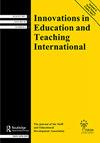Product design training in Industry 4.0: Using infographics and product modelling
IF 4.9
4区 教育学
Q2 EDUCATION & EDUCATIONAL RESEARCH
Innovations in Education and Teaching International
Pub Date : 2023-10-11
DOI:10.1080/14703297.2023.2268599
引用次数: 0
Abstract
ABSTRACTThis study aims to determine the impact of Industry 4.0 innovations, namely infographics and product modelling, on students’ academic performance and visual thinking skills. The experiment involved 164 students. Teaching tools promote the student’s academic performance and visual thinking. The average grade of academic performance was higher in the experimental group (15.70) than in the control group (13.73) after testing. The statistical analysis (t = 2.620) provided evidence supporting the research hypothesis that students who utilised infographics and modelling exhibited significantly enhanced visual thinking skills compared to the students in the control group. These studies allow the development of a paradigm of infographics for further understanding of its capabilities in the process of education. Subsequent scientific papers may study the influence of infographics and modelling on students of other professional fields. It is also necessary to study their influence on other mental parameters, such as cognitive load, motivation, involvement, and others.KEYWORDS: Academic performanceIndustry 4.0infographicsmodellingproduct designvisual thinking Disclosure statementNo potential conflict of interest was reported by the author(s).Data availability statementData will be available on request.Ethics approval and consent to participateAll methods were performed in accordance with the principles of the Declaration of Helsinki. The study was approved by Local Ethics Committees of Hunan University of Science and Engineering (Protocol № 4 of 27.03.2022). Informed consent was obtained from all participants.Additional informationFundingThis research did not receive any specific grant from funding agencies in the public, commercial, or not-for-profit sectors.Notes on contributorsXiaojian BaiXiaojian Bai has a master’s degree. He is an associate professor at the College of Fine Arts and Art Design, Hunan University of Science and Engineering, Yongzhou, Hunan, China. His research interests include design, art design, product modeling, infographics, and visual thinking工业4.0中的产品设计培训:使用信息图表和产品建模
摘要本研究旨在确定工业4.0创新,即信息图表和产品建模对学生学习成绩和视觉思维能力的影响。这项实验涉及164名学生。教学工具促进了学生的学习成绩和视觉思维。经测试,实验组的平均学业成绩(15.70分)高于对照组(13.73分)。统计分析(t = 2.620)提供了支持研究假设的证据,即使用信息图表和建模的学生比对照组的学生表现出显著提高的视觉思维能力。这些研究为进一步了解信息图表在教育过程中的能力提供了一个范例。后续的科学论文可能会研究信息图表和建模对其他专业领域学生的影响。也有必要研究它们对其他心理参数的影响,如认知负荷、动机、参与等。关键词:学术表现工业4.0信息图表建模产品设计视觉思维披露声明作者未报告潜在利益冲突。数据可用性声明数据可应要求提供。所有方法均按照《赫尔辛基宣言》的原则进行。该研究得到了湖南科技与工程大学当地伦理委员会的批准(2022年3月27日第4号议定书)。获得了所有参与者的知情同意。本研究没有从公共、商业或非营利部门的资助机构获得任何特定的资助。作者简介白晓健,硕士学位。现任湖南科技大学美术与艺术设计学院副教授,湖南永州。他的研究兴趣包括设计、艺术设计、产品建模、信息图表和视觉思维
本文章由计算机程序翻译,如有差异,请以英文原文为准。
求助全文
约1分钟内获得全文
求助全文
来源期刊

Innovations in Education and Teaching International
EDUCATION & EDUCATIONAL RESEARCH-
CiteScore
4.80
自引率
5.60%
发文量
68
期刊介绍:
Innovations in Education and Teaching International (IETI), is the journal of the Staff and Educational Development Association (SEDA) www.seda.ac.uk. As such, contributions to the Journal should reflect SEDA"s aim to promote innovation and good practice in higher education through staff and educational development and subject-related practices. Contributions are welcomed on any aspect of promoting and supporting educational change in higher and other post-school education, with an emphasis on research, experience, scholarship and evaluation, rather than mere description of practice.
 求助内容:
求助内容: 应助结果提醒方式:
应助结果提醒方式:


